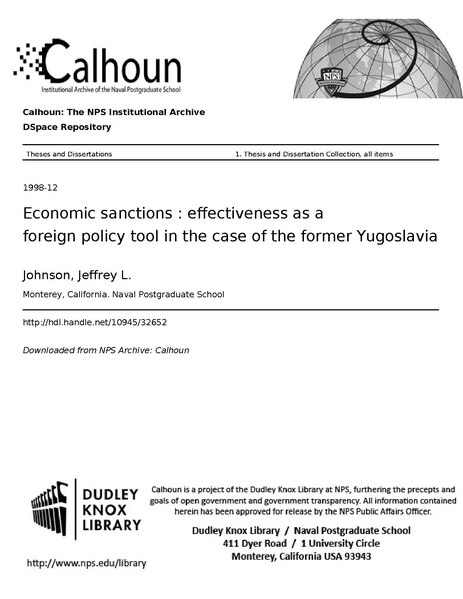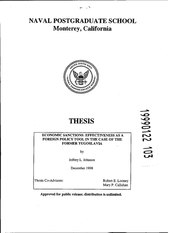File:Economic sanctions - effectiveness as a foreign policy tool in the case of the former Yugoslavia (IA economicsanction1094532652).pdf

Original file (1,275 × 1,650 pixels, file size: 7.47 MB, MIME type: application/pdf, 168 pages)
Captions
Captions
Summary[edit]
| Economic sanctions : effectiveness as a foreign policy tool in the case of the former Yugoslavia
( |
|
|---|---|
| Author |
Johnson, Jeffrey L. |
| Title |
Economic sanctions : effectiveness as a foreign policy tool in the case of the former Yugoslavia |
| Publisher |
Monterey, California. Naval Postgraduate School |
| Description |
Unwilling to use military force, the Western powers, acting through the UN Security Council, relied heavily on economic sanctions against the Federal Republic of Yugoslavia (Serbia and Montenegro) REFERRED TO AS FRY (S/M) to end the war in Bosnia-Herzegovina. The breakup of the former Yugoslavia resulted in wars of secession in Slovenia, Croatia, and finally, Bosnia- Herzegovina. Warring factions divided themselves up along ethnic lines with the Serbians being labeled as the aggressors in the conflict. Economic sanctions were implemented against the FRY (S/M) in May 1992. Economic sanctions were devastating to the FRY (S/M) economy. By 1993, FRY (S/M) President Slobodan Milosevic indicated his support for the Vance%Owen Peace Plan in exchange for the lifting of economic sanctions. The Bosnian Serbs failed to support the peace plan, resulting in the tightening of sanctions on the FRY (S/M). The intent of the tightened sanctions was to force Milosevic to represent the Bosnian-Serbs in future peace negotiations. This strategy worked as indicated by the signing of the Dayton Peace Accords in 1995, which ended the war in Bosnia-Herzegovina. This work examines the role economic sanctions had in ending that conflict. Subjects: NA |
| Language | English |
| Publication date |
December 1998 publication_date QS:P577,+1998-12-00T00:00:00Z/10 |
| Current location |
IA Collections: navalpostgraduateschoollibrary; fedlink |
| Accession number |
economicsanction1094532652 |
| Source | |
| Permission (Reusing this file) |
Approved for public release, distribution unlimited |
Licensing[edit]
| Public domainPublic domainfalsefalse |
This work is in the public domain in the United States because it is a work prepared by an officer or employee of the United States Government as part of that person’s official duties under the terms of Title 17, Chapter 1, Section 105 of the US Code.
Note: This only applies to original works of the Federal Government and not to the work of any individual U.S. state, territory, commonwealth, county, municipality, or any other subdivision. This template also does not apply to postage stamp designs published by the United States Postal Service since 1978. (See § 313.6(C)(1) of Compendium of U.S. Copyright Office Practices). It also does not apply to certain US coins; see The US Mint Terms of Use.
|
 | |
| This file has been identified as being free of known restrictions under copyright law, including all related and neighboring rights. | ||
https://creativecommons.org/publicdomain/mark/1.0/PDMCreative Commons Public Domain Mark 1.0falsefalse
File history
Click on a date/time to view the file as it appeared at that time.
| Date/Time | Thumbnail | Dimensions | User | Comment | |
|---|---|---|---|---|---|
| current | 10:47, 18 July 2020 |  | 1,275 × 1,650, 168 pages (7.47 MB) | Fæ (talk | contribs) | FEDLINK - United States Federal Collection economicsanction1094532652 (User talk:Fæ/IA books#Fork8) (batch 1993-2020 #14621) |
You cannot overwrite this file.
File usage on Commons
The following page uses this file:
Metadata
This file contains additional information such as Exif metadata which may have been added by the digital camera, scanner, or software program used to create or digitize it. If the file has been modified from its original state, some details such as the timestamp may not fully reflect those of the original file. The timestamp is only as accurate as the clock in the camera, and it may be completely wrong.
| Short title | Economic sanctions : effectiveness as a foreign policy tool in the case of the former Yugoslavia |
|---|---|
| Author | Johnson, Jeffrey L. |
| Software used | Johnson, Jeffrey L. |
| Conversion program | Adobe Acrobat 9.52 Paper Capture Plug-in |
| Encrypted | no |
| Page size | 612 x 792 pts (letter) |
| Version of PDF format | 1.4 |
